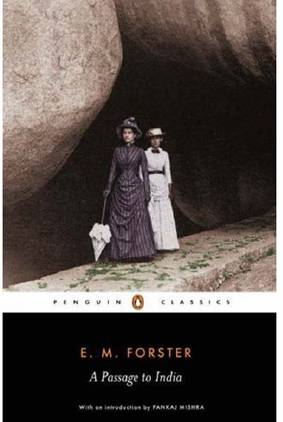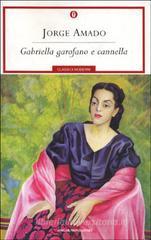
Year of first publication: 1924
Genre: novel
Country: England / India
About the author: Edward Morgan Forster was born in London in 1879. His father died short afterwards and he was brought up by his mother and his great-aunt. At the university in Cambridge he was under the influence of the philosopher G.E. Moore, who inspired his faith in the importance of human relationships and in the cult of art and beauty as the only way to find harmony in this world. He lived for some time in Italy, the background of his first and third novels, Where Angels Fear to Tread (1905) and A Room with a View (1908). In both works he explored the differences between the strictness of English conventions and upper-middle-class codes of social behaviour and the more spontaneous and relaxed way of life of the Italians. Between this two books he published The Longest Journey (1907), a novel about English life. Then followed Howards End (1910), often considered his masterpiece. In 1912 he went to India for the first time and began writing an Indian novel in 1914. A Passage to India was published in 1924; it portrays post-Kipling India at a time of transition. He died in 1970 and the following year Maurice appeared, the novel he had written as early as 1914 to release and overcome the sense of guilt linked to his homosexuality, at that time still regarded as criminal offence. Forster’s books have been made into successful movies.
Plot: When Adela and her elderly companion Mrs Moore arrive in the Indian town of Chandrapore, they quickly feel trapped by its insular and prejudiced British community. Determined to explore the ‘real India’, they seek the guidance of the charming and mercurial Dr Aziz, a cultivated Indian Muslim. But a mysterious incident occurs while they are exploring the Marabar caves with Aziz, and the well-respected doctor soon finds himself at the centre of a scandal that rouses violent passions among both the British and their Indian subjects.
Some thoughts: One more classic in my bag! I’ve read somewhere that E.M. Forster is one of Zadie Smith’s favourite authors (and in fact her third novel On Beauty is an “adaptation” of Howards End) and now I understand why (so far I had only read a few passages from A Room with a View). E.M. Forster is a wonderful writer!
Forster’s main concerns are the difficulties men face in trying to understand each other, especially if there are differences of culture, race and national temperament. Forster portrays a post-Kipling India, where a transformation is taking place. A national consciousness is being formed in the country, despite the fact that the Anglo-Indians try to ignore it. Upon their arrival in Chandrapore, Adela and Mrs Moor claim that they want to see “the real India” and are bored with English people, because they behave as if they were still in England. In other words, they want a taste of the exotic. They think that they are unprejudiced and they can get along with Indian people without encounter difficulties. Mrs Moore is idealized, especially by Dr Aziz: she represents purity and harmony, a successful encounter between the east and the west. Adela, on the other hand, is a more realistic character. She is secretly attracted to Dr Aziz (it is spelled out that he is a fascinating young man), but she doesn’t want to admit it. After having entered the caves, she becomes convinced that Aziz sexually harassed her or even assaulted her. She is terrified by the thought that Dr Aziz, an Indian, might have an interest in her (which he has not, actually, but she unconsciously likes to think that he does). For an Englishwoman it is perfectly all right to have a sexual interest on an Indian (even if it would be shameful to admit it), but it is not acceptable for her that he might have a sexual desire for her. This is emphasized when, during the trial, somebody reflects on the fact that darker races find people with fair skin attractive but not the opposite (which is not true, of course).
Forster, in his Notes on the English Character wrote that the product of the public schools are Englishmen “with well-developed bodies, fairly developed minds and undeveloped hearts”. Ahah, how hilarious: he really was a witty writer after all.
In this novel, full of symbols that I don’t want to analyse here (all right, the caves are supposed to be the womb of the universe and thus the subconscious, whereas the echo represents nature’s benevolence, the harmony of creation), what strikes me the most are the hidden things. For example, there are hidden hints at homosexuality in the friendship between Dr Aziz and Mr Fielding (the scenes in the bedroom being the most obvious example) and the ending is a metaphor of the “suspicious friendship” that links England with India at a time when he British Empire is starting to decline. In other words, Kipling got it right: "Oh, East is East, and West is West, and never the twain shall meet, / Till Earth and Sky stand presently at God’s great Judgment Seat; / But there is neither East nor West, Border, nor Breed, nor Birth, / When two strong men stand face to face, tho’ they come from the ends of the earth!" (from The Ballad of East and West)
Genre: novel
Country: England / India
About the author: Edward Morgan Forster was born in London in 1879. His father died short afterwards and he was brought up by his mother and his great-aunt. At the university in Cambridge he was under the influence of the philosopher G.E. Moore, who inspired his faith in the importance of human relationships and in the cult of art and beauty as the only way to find harmony in this world. He lived for some time in Italy, the background of his first and third novels, Where Angels Fear to Tread (1905) and A Room with a View (1908). In both works he explored the differences between the strictness of English conventions and upper-middle-class codes of social behaviour and the more spontaneous and relaxed way of life of the Italians. Between this two books he published The Longest Journey (1907), a novel about English life. Then followed Howards End (1910), often considered his masterpiece. In 1912 he went to India for the first time and began writing an Indian novel in 1914. A Passage to India was published in 1924; it portrays post-Kipling India at a time of transition. He died in 1970 and the following year Maurice appeared, the novel he had written as early as 1914 to release and overcome the sense of guilt linked to his homosexuality, at that time still regarded as criminal offence. Forster’s books have been made into successful movies.
Plot: When Adela and her elderly companion Mrs Moore arrive in the Indian town of Chandrapore, they quickly feel trapped by its insular and prejudiced British community. Determined to explore the ‘real India’, they seek the guidance of the charming and mercurial Dr Aziz, a cultivated Indian Muslim. But a mysterious incident occurs while they are exploring the Marabar caves with Aziz, and the well-respected doctor soon finds himself at the centre of a scandal that rouses violent passions among both the British and their Indian subjects.
Some thoughts: One more classic in my bag! I’ve read somewhere that E.M. Forster is one of Zadie Smith’s favourite authors (and in fact her third novel On Beauty is an “adaptation” of Howards End) and now I understand why (so far I had only read a few passages from A Room with a View). E.M. Forster is a wonderful writer!
Forster’s main concerns are the difficulties men face in trying to understand each other, especially if there are differences of culture, race and national temperament. Forster portrays a post-Kipling India, where a transformation is taking place. A national consciousness is being formed in the country, despite the fact that the Anglo-Indians try to ignore it. Upon their arrival in Chandrapore, Adela and Mrs Moor claim that they want to see “the real India” and are bored with English people, because they behave as if they were still in England. In other words, they want a taste of the exotic. They think that they are unprejudiced and they can get along with Indian people without encounter difficulties. Mrs Moore is idealized, especially by Dr Aziz: she represents purity and harmony, a successful encounter between the east and the west. Adela, on the other hand, is a more realistic character. She is secretly attracted to Dr Aziz (it is spelled out that he is a fascinating young man), but she doesn’t want to admit it. After having entered the caves, she becomes convinced that Aziz sexually harassed her or even assaulted her. She is terrified by the thought that Dr Aziz, an Indian, might have an interest in her (which he has not, actually, but she unconsciously likes to think that he does). For an Englishwoman it is perfectly all right to have a sexual interest on an Indian (even if it would be shameful to admit it), but it is not acceptable for her that he might have a sexual desire for her. This is emphasized when, during the trial, somebody reflects on the fact that darker races find people with fair skin attractive but not the opposite (which is not true, of course).
Forster, in his Notes on the English Character wrote that the product of the public schools are Englishmen “with well-developed bodies, fairly developed minds and undeveloped hearts”. Ahah, how hilarious: he really was a witty writer after all.
In this novel, full of symbols that I don’t want to analyse here (all right, the caves are supposed to be the womb of the universe and thus the subconscious, whereas the echo represents nature’s benevolence, the harmony of creation), what strikes me the most are the hidden things. For example, there are hidden hints at homosexuality in the friendship between Dr Aziz and Mr Fielding (the scenes in the bedroom being the most obvious example) and the ending is a metaphor of the “suspicious friendship” that links England with India at a time when he British Empire is starting to decline. In other words, Kipling got it right: "Oh, East is East, and West is West, and never the twain shall meet, / Till Earth and Sky stand presently at God’s great Judgment Seat; / But there is neither East nor West, Border, nor Breed, nor Birth, / When two strong men stand face to face, tho’ they come from the ends of the earth!" (from The Ballad of East and West)
In conclusion, a truly wonderful novel and one that I would like to reread one day.


